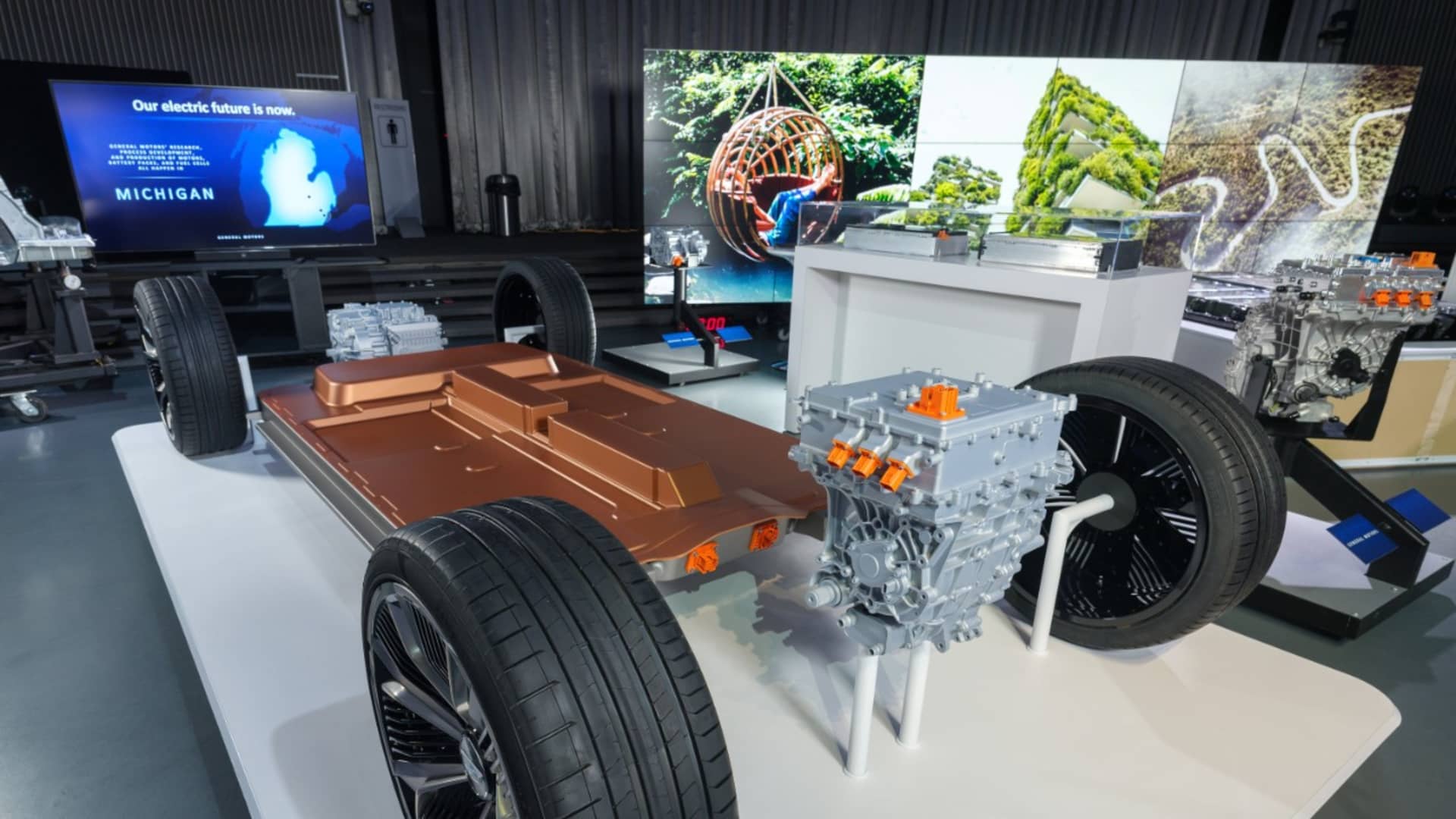
General Motors unveiled Ultium, its new modular platform and battery system, on March 4, 2020 at its Technology Center campus in Warren, Michigan.
Photos by Steve Fecht for General Motors
DETROIT — There is an uncertain issue in the discussions in already contentious labor talks between the UAW and major automakers.
The multibillion-dollar electric-vehicle battery factory and its thousands of expected workers are critical to the future of the auto industry and are uniquely positioned to have broad ramifications for the UAW, automakers and President Joe Biden’s push for domestic manufacturing.
But there is a problem. They do not participate in negotiations.
Nearly all of the announced factories are independent joint ventures with their own operations, negotiations and contracts – contracts that are outside the scope of the labor agreement being negotiated General Motors, Ford and star before the September 14th deadline. The automaker argues that the joint venture plant is therefore not part of the legal discussions.
But the UAW leadership has made ensuring a “just transition” to electric vehicles for auto workers, including battery plants, a top priority. Current and former union leaders told CNBC that for the union’s long-term survival, battery factories must be a priority for labor organizing, whether or not they are directly discussed in a national agreement.
“It’s a sham,” UAW President Shawn Fain said of the battery facility last week. “At the end of the day, they could form a joint venture and still have an obligation to their members, their workers, but there’s a reason they chose not to because they want to drive a race to the bottom.”
UAW President Sean Fine, right, talks with union member Jerome Buckley outside General Motors Plant Zero in Detroit on July 12, 2023.
Michael Whelan/CNBC
Either side could use the battery factory as indirect leverage in negotiations, according to current and past negotiators on both sides.
The idea, these experts say, is to include future protections (or restrictions) for EV workers in labor agreements covering traditional auto workers so they could serve as a model for future EV workers to negotiate.
GM Ultium workers
GM is the only Detroit automaker with a joint venture battery plant that is operational and unionized, making it the first automaker in the country to face this particular negotiating dynamic and a landmark plant that sets standards for the industry.
GM Chief Executive Mary Barra and other executives said it was up to members to decide whether battery factories should unionize because those types of jobs increasingly displace traditional assembly jobs.
However, they argue that factory workers should be paid less than traditional assembly work because it’s a different kind of work — making parts for a complete vehicle rather than assembling a final product — that’s traditionally done by third-party suppliers who often earn less than workers employed directly by automakers.
At GM’s Ultium battery plant in Ohio, workers make between $16 and $22 an hour and receive full benefits, incentives and tuition assistance.
That’s in line with the supplier and “subsystem” work currently done by UAW members at major automakers, but less than the wages of traditional auto workers who assemble vehicles and engines, who can earn anywhere from $18 an hour to more than $32 an hour.
General Motors CEO Mary Barra speaks at the ZERO electric vehicle assembly plant of General Motors Plant on November 17, 2021 in Detroit, Michigan.
Nick Antaya | Getty Images
Fein was particularly critical of automakers and the Biden administration for using billions of dollars in federal taxes to subsidize the facilities without promising better wages and benefits for workers.
“The message to the Biden administration is simple, if we’re going to do something for these companies to help make that transition, labor can’t be left out,” Fein said outside the Strandis factory last week.
Fein has refused to support President Joe Biden for re-election until union concerns about the auto industry’s transition to all-electric vehicles are addressed.
The Detroit automaker announced an investment of about $22 billion in eight U.S. battery factories, including a $3.5 billion plant in Michigan that will be a wholly owned subsidiary of Ford, rather than a joint venture.
All plants are planned to start operating within the next four years.
set the standard
The UAW released a white paper last week detailing some of the safety issues and concerns reported at the Ultium facility. The report was released two days before the union officially began national contract negotiations with the Detroit automaker.
In its white paper, the union suggested that a GM national pact could provide a solution to problems on the ground, calling the forthcoming UAW-GM national labor pact a “very successful model for safety protections that could be applied to Ultium Cells Lordstown and other battery makers.”
UAW Local 5960 member Kinethia Black applies the brakes on a 2022 Chevrolet Bolt EUV during vehicle production at the General Motors Orion Assembly Plant in Orion Township, Mich., Thursday, May 6, 2021.
Photo by Steve Fecht for Chevrolet
The union could push for a multi-company agreement or a new national agreement with the company, then bargain with Ultium to build on the final deal.
While the union wants the highest wages for battery work, it can also create contracts for subsystem work. GM Subsystems employees currently start at $18.50 an hour and can make $22 or $24 an hour, depending on the job.
However, Ultium and the UAW remain “substantially at odds” over a salary and benefits agreement, according to two people familiar with the matter.
GM declined to comment on the white paper and referred questions to Ultium Cells, its joint venture with LG Energy Solutions.
A Ultium spokesman condemned the report and the UAW’s characterization of the plant, calling the UAW’s characterization of safety issues “intentionally false and misleading.”
Svlook








